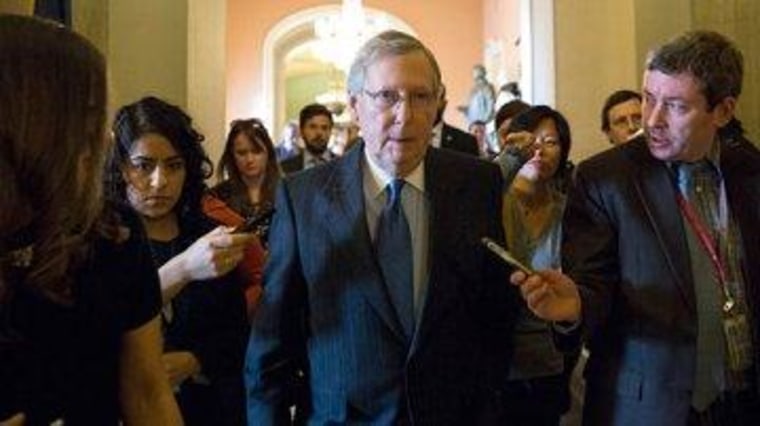By the time Senate Minority Leader Mitch McConnell turned to Vice President Biden as his new negotiating partner, one thing was clear: Senate Majority Leader Harry Reid had simply run out of counteroffers. Democrats had gone as far as they could go, and Republicans weren't willing to say, "Yes."
Just how far had Reid gone in making concessions? For one thing, the income threshold for higher rates was moved up from $250,000 to $400,000 (or depending on which insider account you believe, $450,000). For another, Democrats had also largely caved on estate taxes, raising the eligibility threshold and accepting a lower rate.
Both of these concessions, it's worth emphasizing, would mean far less deficit reduction -- the ostensible point of this exercise. The tradeoffs are a reminder that when Republicans say they're desperate to address the debt, they really don't mean it. Democratic proposals do far more to reduce the fiscal shortfall than GOP alternatives -- and Republicans are the ones who pretend to see a "debt crisis."
As if this weren't enough, Democrats were also offering to accept these terms without a debt-ceiling increase. Instead, all Dems would get in return are measures that have traditionally enjoyed bipartisan support: middle-class tax breaks, extended jobless aid, and temporary fixes on AMT and Medicare reimbursement rates.
Democrats are even prepared to postpone the sequester, a policy Republicans say they're desperate to avoid.
It's unclear why McConnell wasn't prepared to accept this overly generous package, but whatever the motivation, it's unlikely Republicans will get a better offer later in the week if the deadlines go unmet and Democratic numbers in both chambers improve.
So what more do GOP leaders hope to get out of the process? McConnell reportedly wants a $550,000 income threshold for higher rates (which would mean less deficit reduction) and lower rates on capital gains (which would mean less deficit reduction).
What's more, dealing with the sequester is proving to be surprisingly complicated.
CNN learned on Sunday from Democratic and Republican senators that Democrats at one point suggested postponing or delaying the sequester for one or two years. Republicans exiting their caucus meeting Sunday afternoon, including Snowe and Sen. Bob Corker of Tennessee indicated the idea was a non-starter with their party, largely out of fear that the sequester delay would not be offset and would add to the deficit.
It's difficult to understand exactly what Republicans are trying to do here. On the one hand, they want higher deficits by shielding the wealthy from higher tax rates, and on the other hand, they say they want lower deficits by keeping a sequester policy they simultaneously say they oppose.
One of the reasons the talks have gone so poorly is that GOP officials never actually got around to crafting a specific plan or setting clear parameters of which goals they found worthwhile.
Regardless, everything is quickly coming to a tipping point. McConnell and Vice President Biden were reportedly negotiating until midnight, and in about a half-hour, Harry Reid will reportedly come to the Senate floor and offer the political world an update, and perhaps even a roadmap of what happens next.
Update: Reid did, in fact, speak at 11, but didn't have much to report. Discussions "continue" and there are "a number of issues on which the two sides are still apart." He added, "There are still some issues that need to be resolved before we can bring legislation to the floor."
